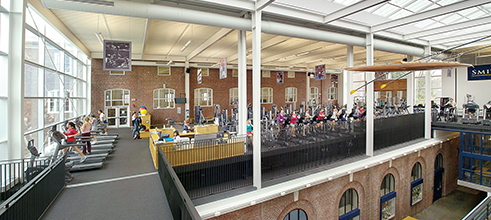Document Type
Article
Publication Date
2-2023
Publication Title
Menopause
Abstract
Importance and Objective: Hot flashes (HFs) are a prevalent feature of menopause. Hot flashes can be bothersome and affect quality of life. However, HFs have also been associated with the risk for cardiovascular disease. Therefore, providing current evidence on the effect of therapies to reduce HFs can help patients and providers with decision making. This review provides details on the scientific evidence to date related to the effect of physical activity (PA) and exercise to alter the HF experience in women
Methods: The PubMed database was searched between June 2020 and June 2022 for currently available evidence regarding the relation between PA and exercise and HFs. Our analysis included randomized control trials on exercise training, epidemiological studies, and studies evaluating acute exercise on the self-reported and objectively measured HF experience in addition to systematic reviews on the topic published as of June 2022.
Discussion and Conclusions: The majority of evidence from randomized control trials indicates that aerobic and resistance exercise training lead to a decrease in subjectively experienced HFs. The limited available studies on acute exercise indicate that a bout of moderate-intensity exercise may decrease objectively measured and self-reported HFs but acute increases in PA intensity above accustomed levels may influence subjective HF experience. Some evidence suggests that for those with depression, habitual PA may be an effective way to reduce HF symptoms. Weighing the avail- able evidence, for people who experience HFs, engaging in regular moderate-intensity PA, including aerobic and resistance exercise, may be an effective therapy to reduce HFs and women should be counseled on the benefits of regular, moderate exercise. However, significant gaps in knowledge remain about the optimal exercise prescription, effectiveness for a diverse population, meaning of differences between objective and subjective experience, and mechanisms that lead to changes in HFs.
Keywords
Exercise, Hot flashes, Menopause, Physical activity
Volume
30
Issue
2
First Page
218
Last Page
224
DOI
10.1097/GME.0000000000002107
Rights
© 2022 by The North American Menopause Society
Recommended Citation
Witkowski, Sarah; Evard, Rose; Rickson, Jacquelyn J.; White, Quinn; and Sievert, Lynnette Leidy, "Physical Activity and Exercise for Hot Flashes: Trigger or Treatment?" (2023). Exercise and Sport Studies: Faculty Publications, Smith College, Northampton, MA.
https://scholarworks.smith.edu/ess_facpubs/42


Comments
Peer reviewed accepted manuscript.